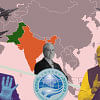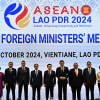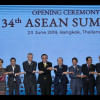Mission to China: Is the PM ready to take a bold position on RCEP?

Bangladesh is not a member of the Shanghai Cooperation Organisation (SCO). Nor is it a member of BRICS+. It is not ensconced within ASEAN either. By extension, Dhaka feels it can remain outside the planet's largest trading area, Regional Comprehensive Economic Partnership (RCEP). I have lost count of the times I mentioned RCEP in conversations in Dhaka, only to be met with a blank stare. The RCEP does not elicit curiosity.
The fault lies with the strategic community in Dhaka. They have failed (perhaps even wilfully) to argue for a coherent strategy towards China and Southeast Asia. The result of apathy and opaque concepts is that Bangladesh has "Brexited" itself away from the new core of the world economy on our doorstep. Metaphorically, it has plumped for the slow train, drifting around in South Asia, rather than hitch a ride on the high-speed trains of China, Japan, Korea and ASEAN. We could have both. Geography and history demand it.
Are we aiming low, missing RCEP?
So, what can we hope for from the PM's flight to Beijing? I am worried that no one seems to be worried.
Over two days on July 9 and 10, Prime Minister Sheikh Hasina is expected to have intense talks with Prime Minister Li Qiang, and a broader discussion about a deeper relationship with President Xi Jinping. Are her advisors failing to grasp what is at stake and not feeding talking points for a much more ambitious undertaking?
The current batch of "goodies" look like a string of projects at best, where the parts outweigh the sum. At worst, to cynics, it looks like a shopping trip of cash and projects. Even working on a free trade area with China is insufficient.
Fundamentally, we need to move on from merely pleading for more infrastructure, funded by foreign loans but not by themselves earning foreign currency. The vulnerable economy is crying out for foreign (Chinese) investment into export-producing industrial platforms, to earn the dollars and Yuan to pay back ever higher foreign debt, which is mostly non-Chinese. Instead of acting as a supplicant for aid, we should be negotiating terms of a partnership where both China and Bangladesh gain something (a win-win, as Chinese diplomats like to say).
Contrast this with the trip by the Sri Lankan president in mid-2023 and how, before and after his visit to Beijing, he made joining RCEP the centrepiece of a new strategy towards the East and Southeast Asia. Colombo understands that RCEP offers a priceless opportunity to leapfrog the most industrialised state in India, neighbouring Tamil Nadu, by entering the Chinese-led trading area.
New nodes of supply chains will appear on that island, if admitted. In other words, selected sections of manufacturing processes will decamp from, say, China or Malaysia, and seek low-cost destinations within the trade area. The latter point is important because RCEP is not merely about lowering tariffs but adhering to new technical standards and industrial practices. Diversification, better quality, and higher technology are the prizes.
The oft-stated visions of a Digital Bangladesh and its offspring, Smart Bangladesh, require plugging into the world of Huawei, Xinyi Solar and BYD. That undertaking can quite easily function in parallel to Indian connectivity links through Bangladeshi territory (another win-win).
From strategic ambiguity to strategic clarity
Too often, Dhaka has followed the Indian posture of strategic ambiguity. Others might consider this ever-so-clever "balancing" as strategic dithering, founded on short-term opportunities, laced within an ambience of fear of offending any or all of the Big Three (India, US, and China, in that order).
The PM, with her political instincts, understands the downsides of committing too much to Delhi's demands. Wiser heads know that Delhi has its own fears and interests. They recognise that cooperation, not confrontation, is the sine qua non of Delhi-Dhaka ties. Yet, this cannot be to the detriment of Bangladeshi economic imperatives. Dhaka has given much more than would have been possible two decades ago—ending separatist bases for Northeast Indian guerillas forces, allowing transport corridors from Kolkata through Bangladesh to Tripura and Assam, and deferring to Indian pressure to "go slow" on Chinese projects. The last point is now no longer acceptable to the sovereign and economic interests of Bangladesh, nor its restive population.
Delhi has been heavily criticised within opposition quarters in Bangladesh for its support to the Awami League during the one-sided elections in January. Now, Delhi has nowhere else to go. It can hardly try to not back the Awami League since the alternative forces are viscerally against Delhi. Moreover, with Modi electorally weakened, he has other agendas to attend to.
Were Dhaka to take bold steps in its approach to Beijing and the wider region, Delhi would be as passive as Washington was in January.
Acting firmly but fairly by retaining commitments to India alongside pursuing a new, enhanced economic partnership with China would extinguish some domestic fires. This reminds me of the PM's rather strange journey to the Munich Security Conference a few months ago. The PM acquiesced with her foreign policy wonks and Western personages to hobnob with Western military officials, primarily focused with war in Eastern Europe and forthcoming adventures on the South China Sea. Not only did Sheikh Hasina skilfully avoid antagonising Russia as well as her Western hosts by stating the position of neutrality (as per the Global South position), but she also made some brave remarks, strongly condemning the slaughter in Gaza.
The mission to Beijing offers her another opportunity to act on her instincts. She can make her move, telling her Chinese hosts that Bangladesh wants an early entry into RCEP. Missing this boat now will mean facing the music soon enough.
Farid Erkizia Bakht is a political analyst.
Views expressed in this article are the author's own.
Follow The Daily Star Opinion on Facebook for the latest opinions, commentaries and analyses by experts and professionals. To contribute your article or letter to The Daily Star Opinion, see our guidelines for submission.

 For all latest news, follow The Daily Star's Google News channel.
For all latest news, follow The Daily Star's Google News channel. 











Comments